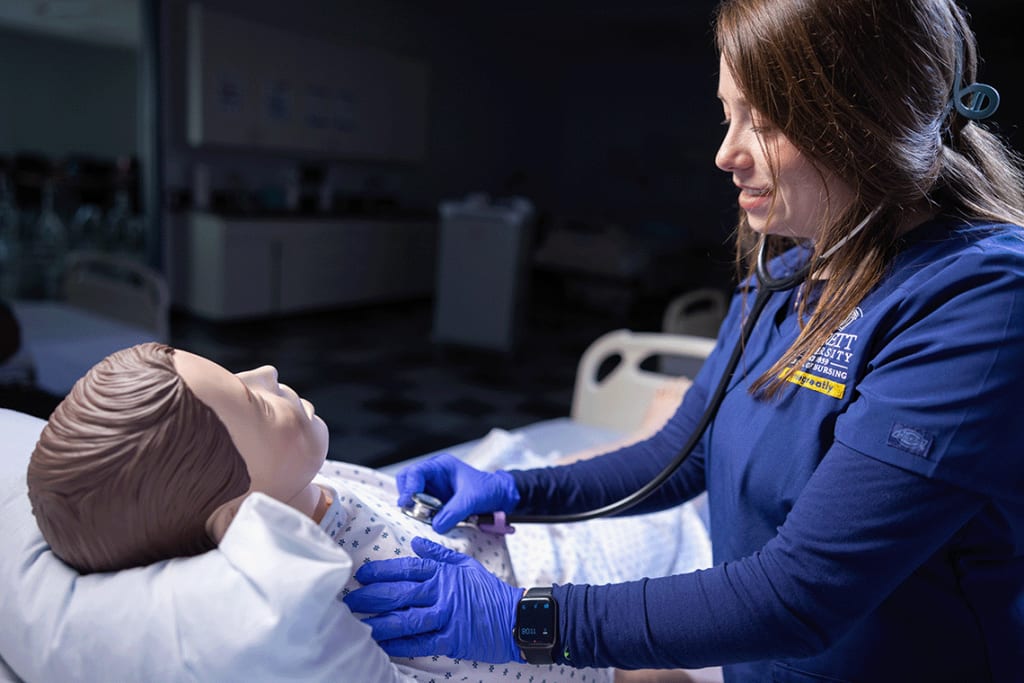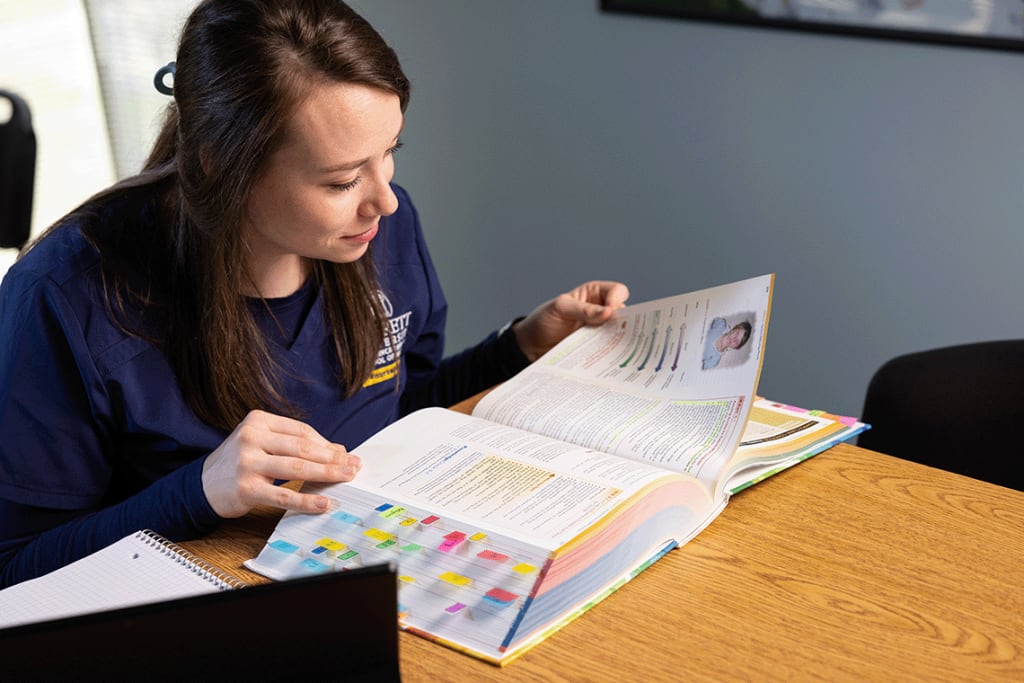How to Succeed in Nursing School
Each blog post is dated and contains accurate information as of that date. Certain information may have changed since the blog post publication date. If you would like to confirm the current accuracy of blog information, please visit our ABSN overview page or contact admissions at (866) 483-8705.
Wondering how to succeed in nursing school? There are lots of effective nursing school tips for success, including forming a study group with other students in your cohort, practicing good self-care, setting SMART nursing school goals and establishing a support network.

Nursing school is an intensive learning experience by necessity, as nurses are responsible for the lives of their patients. If you feel called to serve others by becoming a nurse, you can look forward to being pleasantly challenged to achieve your potential while in nursing school and beyond. Choosing to attend nursing school at Averett University, however, ensures that you’ll have plenty of student support resources to assist you along the way—from admissions to graduation.
At Averett, you could graduate with a Bachelor of Science in Nursing (BSN) in as few as 16 months if you have prior non-nursing education. Before you apply to our Accelerated Bachelor of Science in Nursing (ABSN) program, it’s a good idea to take a look at how to prepare for nursing school and how to succeed in nursing school once you’re here. Use the following nursing school tips for success to get started.
1. Clearly Identify Your Motivators
Before you even begin accelerated nursing school, it’s wise to look honestly within yourself and reflect upon your reasons for wanting to become a nurse. Ensure your heart is in the right place and that you have a strong reason for becoming a nurse. This is significant because nursing school can be stressful at times. If you have a strong motivation for earning your nursing degree, you’ll be more likely to weather the tough times.
Once you know nursing school is the best path for you, consider how you’ll be able to handle the pace of an accelerated program. In an accelerated nursing program like the 16-month ABSN program at Averett, students need to commit much of their time to studying. If you have children, you’ll need support to manage the home while you spend most of your time studying. Be honest with yourself about your nursing school goals and what you can reasonably handle.
“Definitely have a good support system and don’t go into it lightly,” says Michelle Balderrama, an ABSN student at Averett. “It’s going to be hard.”

2. How to Prepare for Nursing School: Adopt the Right Mindset
Another key aspect to succeeding in accelerated nursing school is to enter with a learning mindset. Be honest about how much you’ll be challenged. Even if you have prior healthcare experience, nursing school will be challenging and there will be quite a lot to learn, so be ready to put in the work every single day.
In addition to staying humble and ready to learn, another way to maintain the right mindset is to treat nursing school like a full-time job. It won’t be like high school or even your prior college degree program. Nursing school often requires more than a 40-hour week for successful completion.
3. How to Succeed in Nursing School with SMART Nursing School Goals
What’s a SMART goal? It’s an acronym for the following:
- Specific
- Measurable
- Attainable
- Relevant
- Time-specific

SMART goals are important because they focus on the method of achieving the desired outcome, rather than solely on the outcome itself. When you follow the process, you can achieve the result. For example, here’s a look at a regular goal and then its SMART version:
- Regular goal: “I would like to get a high grade on every nursing school exam.”
- SMART goal: “I would like to score 90% or higher on nursing school exams. I will accomplish this by spending time reviewing material after each class and by asking the instructors questions when I don’t understand something.”
4. Make a Detailed Schedule
Another key way to set yourself up for success in an accelerated nursing program is to be intentional about creating a schedule with all your classes, school assignments and due dates. “Get your course schedule and write down what is due on what day. I do that for the whole month,” Michelle says.
In an accelerated nursing program, tests are a large part of your grades, but don’t disregard your other assignments. You can optimize your grades by completing assignments well.
Make sure you also add test dates, clinicals and skills and simulation labs to the schedule. Michelle finds it helpful to write down what she wants to read and accomplish by what date, as this keeps her on task and organized.

What are simulation lab nursing school experiences? Read more to learn how they work and why they’re important.
5. Know Your Ideal Learning Style
There are many methods of studying, and not every method may be effective for every student. Experiment with a few different styles or methods of studying to find one or more that work best for you. Here’s a look at some options to try:
- Pre-testing – Before learning a new nursing concept, answer questions on it. You’ll likely get them wrong, but research shows that “pre-testing” improves learning retention when you do begin to study the material.
- Spaced practice – Instead of studying one topic or concept for an hour and then moving on, study that topic for 15 minutes on four separate days—or a similar schedule.
- Self-quizzing – When reading your textbooks, develop questions along the way. Ask yourself those questions after reading a section.
- Paraphrasing and reflecting – After reading a section or studying a topic, take your eyes away from the book and screen. Spend a few minutes reflecting on what you read and put the topic into your own words. Pretend that you’re teaching someone else. How would you explain the concept to them?

Knowing how to study is essential to success in nursing school. Check out these top 10 study tips for nursing students.
6. Form a Consistent Study Group
If you ask a current or former student for nursing school tips for success, they may recommend forming a study group that meets on a consistent schedule. The group members should review the material on their own and then meet to discuss it. Your group could also create study plans and prepare for exams together by quizzing each other.
When forming a study group, Kahla Michaels, an Averett ABSN student, says it’s important to have group members who take classes seriously. “Who’s going to help me succeed, and who can I help succeed?” she says.
Checking in throughout the week—even during video calls—may boost academic achievement while building camaraderie within your cohort.
7. Reach Out to Your Instructor if You Need Help
If you have questions or need more guidance about the material or what to focus on for an exam, get in touch with your instructor and let them know what you need. One of the cornerstones of how to succeed in nursing school is to be proactive and willing to reach out to your instructors as needed.
In a hybrid accelerated nursing program, you are responsible for learning the material for exams, so be willing to do what it takes to set yourself up to succeed. If you and your classmates need further clarification before an exam, ask your instructor to provide more resources or direction. It’s key for accelerated students to stand up and take charge of their learning.
8. Be Prepared to Teach Yourself
One challenge of accelerated nursing programs is that students need to take the reins with their education in a more proactive way than they may have experienced in the past. That means being comfortable making a study plan and working through material on your own will serve you well. With the online portion of the curriculum comes greater flexibility, but also greater responsibility. Get comfortable with overseeing your own progress and holding yourself accountable.
9. Practice Good Self-Care Habits

Nursing school will take most of your time, but for your mental wellness, it can’t take all your time. Whenever possible, get into the routine of setting aside time each day for what’s most important to you. You may need to let some less important hobbies or activities fall to the side because your time is limited.
The following self-care tips may help you successfully complete nursing school without feeling burned out:
- Sleep – Prioritize your sleep. Your brain depends on high-quality sleep to clear away toxins and other waste products that accumulate in the brain. Research shows that human brains need sleep to accomplish this. Furthermore, without sufficient sleep, you’ll struggle with learning retention, memory recall and concentration.
- Nutrition – When you’re studying for long hours, it can be tempting to reach for a sugary snack to get a jolt. Unfortunately, this will only lead to an energy crash later. Instead, focus on fueling your body with nutritious foods and remember to drink plenty of water.
- Exercise – It can be tough to figure out how to work exercise into a nursing school schedule, but it is doable and important for your overall wellness. Instead of going for an hour-long jog, try doing high-intensity interval training (HIIT) workouts, which can provide great health benefits without a significant time commitment.
- “Me time” – Everyone needs a little “me time” now and then. It’s important for your mental health to set aside a little time to do something enjoyable—even if it’s just 10 minutes of yoga in the morning.
10. Have a Good Support System
For success in an accelerated BSN program, having the support of your loved ones pays dividends. Whether you are single or have a family, having people who can step in and provide you with a warm meal or an encouraging word can make all the difference.
A support system, whether its family or members of your cohort, is especially helpful during clinical rotations. Your clinical placements will challenge you physically and emotionally as you work in a healthcare setting for the first time. Leaning on your support system during this time will help you rally and meet the demands.

Clinical rotations are where you learn what it is like to work as a nurse in a hospital setting. When you’re ready to start clinical rotations, check out these 8 nursing clinical tips.
Ready to Get Started with Your Nursing Journey?
Despite the challenges of nursing school, it’s definitely possible to achieve your goals—particularly when you take advantage of the strong student support resources available at Averett. Our dedicated faculty are here to help you find success and earn your BSN.
The hard work of the ABSN program at Averett prepares our students to graduate and become qualified, practice-ready nurses. If you have a non-nursing bachelor’s degree or at least 60 non-nursing credits from an accredited institution, reach out to our admissions counselors to get started.
